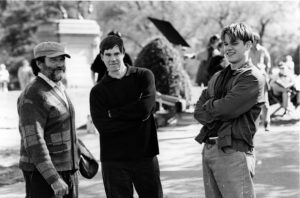The widow of actor Robin Williams is discussing the events leading up to his passing in public for the first time in more than a year, as well as providing information on the illness he had at the time of his death.
The widow, Susan Schneider Williams, blamed diffuse Lewy body dementia rather than sadness for her husband’s death in 2014 in interviews with People magazine and ABC News.
Robin didn’t die of depression, Mrs. Williams claimed in an interview with People magazine. The sign of depression was only a minor one out of, say, 50 others.
“This was a really rare instance,” she continued, “and I pray to God that it will help the millions of people who are suffering with Lewy bodies and their loved ones by providing some clarity on the condition. Because we were ignorant, he had no idea.
On Tuesday, Mrs. Williams was interviewed for a segment that aired on ABC’s “Good Morning America.” Additional segments of the interview will air on the network’s “World News Tonight” and “Nightline” programs that evening, as well as on Friday’s episode of “The View” in the morning.
On August 11, 2014, Mr. Williams, a stand-up comedian and actor best known for his roles in “Mork & Mindy,” “Good Morning, Vietnam,” “Good Will Hunting” (for which he received an Oscar), and “Dead Poets Society,” committed suicide in the Tiburon, California, the house he shared with his wife. He was 63.

Photo Credits – Respective Owner
The actor has “been suffering significant depression of late,” according to a statement made that day by his press reps.
Three days later, Mrs. Williams released a statement in which she stated her husband had “struggled with his own struggles of depression, anxiety, as well as early stages of Parkinson’s disease, which he was not yet ready to address publicly.”
However, a coroner’s report for Marin County, California, issued that fall revealed that Mr. Williams had widespread Lewy body dementia. Due to the overlapping symptoms of the two diseases, they are commonly mistaken for one another.

In the ABC News interview, Mrs. Williams stated that Mr. Williams has experienced “this endless procession of symptoms” since fall 2013, though “not all of them would rear their head at once.”
“It was like playing Whac-a-Mole. This month, which symptoms do you have? Was my husband being overly cautious? I questioned. There are no solutions. Therefore we are chasing it. We’ve already exhausted trying every option.
Lewy body dementia affects 1.3 million people in the United States, and its symptoms are getting tougher to deal with every day, particularly for those like Mr. Williams, who is still relatively young.

The condition is frequently confused for Parkinson’s or Alzheimer’s disease since it can cause stiffness and mobility issues similar to Parkinson’s, as well as memory and thinking failures similar to Alzheimer’s. The similarities between the three illnesses are so great that it frequently takes over a year — and numerous trips to specialists — to make an accurate diagnosis.
Norma Loeb, a board member of the Lewy Body Dementia Association, whose mother, Lillian, passed away from the condition in September, said, “It took about three years for us.” It was standard practice for me to conduct my own research online.
By then, more recognizable dementia symptoms are typically evident, such as chronic sleep issues, “fluctuations” in thinking (where mental sharpness comes and goes), and visual hallucinations, frequently of animals, kids, or miniature humans.
According to Dr. James E. Galvin, a professor and associate dean for research at Florida Atlantic University, those visions may be frequent enough to resemble schizophrenia or another psychiatric disease. According to him, “in certain situations, people are being treated with psychiatric medicines” that are inappropriate for the patient’s condition.
Many patients are aware of all these changes and their prognosis in the early stages of the disease. There is no cure, and the decline is continuous and greater than the typical 10% annual decline in tests of cognitive function reported in Alzheimer’s. Mr. Williams might have been strong and conscious enough to take action to escape his fate.

Dr. Edward Huey, an assistant professor of psychiatry and neurology at Columbia, said that if you have insight into what is happening and some of the related symptoms, such as depression and hallucinations, you may be at risk. We believe the suicide risk is highest during that time.
The actor’s third wife, Mrs. Williams, recently resolved a legal conflict with the actor’s three children from his first two marriages regarding his estate.
In a petition filed in California Superior Court in San Francisco last winter, Mrs. Williams claimed that she was due money and other assets under a trust that Mr. Williams had established for her.

Zak, Zelda, and Cody Williams, the actor’s children, claimed in their own court documents that Susan Williams had prevented them from receiving personal goods from their father that he had promised them and that she was attempting to obtain money to which she was not legally entitled.
Although Mrs. Williams said, she received “the few emotional objects she desired,” the facts of the settlement were not made public.


